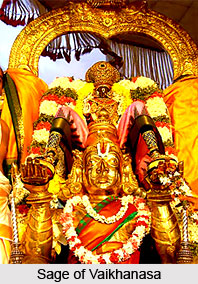 Vikhanasa refers to followers as well as the fundamental philosophy whose name is derived from Sage Vaikhanasa. The followers of Vaikhanasa are Brahmins of Krishna Yajurveda Taittiriya Shakha as well as Vaikhanasa Kalpasutra. Vaikhanasa is monotheistic in its philosophy. However it also incorporates pantheistic elements. This tradition focuses on rituals and worship of Lord Vishnu.
Vikhanasa refers to followers as well as the fundamental philosophy whose name is derived from Sage Vaikhanasa. The followers of Vaikhanasa are Brahmins of Krishna Yajurveda Taittiriya Shakha as well as Vaikhanasa Kalpasutra. Vaikhanasa is monotheistic in its philosophy. However it also incorporates pantheistic elements. This tradition focuses on rituals and worship of Lord Vishnu.
The Vaikhanasa originated as a group of ascetics. According to various sources there was a Vaikhanasa ascetic community before the Common Era. They have also been mentioned in the Narayaniya which is a delayed section of the Mahabharata. As the Vaishnavasa became more popular, the role of the Vaikhanasas declined in the temples. Ramanuja, leader of the Vaishnavas replaced the Vaikhanasa system of worship. Vaikhanasas however continued to be important. Vaikhanasas are the chief priests in most of the Vaishnava temples in South India.
The Vaikhanasa Brahmins are a tiny vaishnavite Brahmin community that consists of about 2,500 families dispersed in South India at Vaishnava temples in Tamil Nadu, Andhra Pradesh and parts of Karnataka.
It is claimed by Vaikhanasas that they are a surviving school of Vedic ritual, the Taittiriya sakha of the Krishna Yajurveda. According to Vaikhanasa tradition the sage Vikhanas composed the Vaikhanasa Kalpasutra and taught four disciples from the lineage of Atri, Bhrigu, Kashyapa, and Marichi. Vaikhanasa literature is concerned with the ritual, prescribing the rituals and the ways to perform it. Temple worship is a continuation of Vedic fire sacrifice for the Vaikhanasa. The Vaikhanasas evolved the theory of the five aspects of Lord Vishnu. They are: Vishnu, the all-pervading deity; Purusha, the principle of life; Satya, the stationary aspect of deity; Achyuta, the final aspect; and Aniruddha, the irreducible aspect.
According to the Vaikhanasa doctrine of the two forms of Vishnu, the niskala, the unfigured, and the sakala, the figured, two cult images are differentiated. There is the large static image representing Vishnu`s niskala form and a smaller movable image representing Vishnu`s sakala form.
This article is a stub. You can enrich by adding more information to it. Send your Write Up to content@indianetzone.com




















